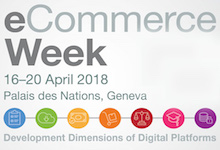High-level dialogue: Development dimensions of digital platforms
17 Apr 2018 15:00h - 17:30h
Event report
[Read more session reports from the UNCTAD E-Commerce Week 2018]
The moderator, Ms Catherine Fiankan-Bokonga (Correspondent at the United Nations in Geneva, Vice-president, Swiss Press Club) opened the session by noting that digital platforms are increasingly used by consumers as they facilitate e-commerce, online and mobile payments, and online labour. She considered that, according to the 2017 Information Economy Report of the United Nations Conference on Trade and Development (UNCTAD), the importance of platforms in the evolving digital economy is increasing.
Dr Mukhisa Kituyi (Secretary-General, UNCTAD) stated that we are currently confronted with a challenge, namely the growing importance of the digital economy for any business that is trying to penetrate a new market or struggling in the competition with another big enterprise. He explained that 70% of the business conducted by companies in Europe is done online. However, such percentage goes down to 2% for least developed countries (LDCs). For small state islands, it is even more challenging as the broadband cost is extremely high and the Internet connection is very poor.
He recognised that ‘technology is not a panacea for human problems’ as we see that globalisation is also correlated with inequality. He concluded by affirming that commerce is nowadays driven by aggregation of data and those actors who do not take part to it are in difficulty. He considered that the biggest challenge for digitalisation is balancing inclusion and integrity. More precisely, the actual difficulty lies in the balancing between endorsing innovators and valorising the role of regulators banning potential illegal practices.
Dr Nick Srnicek (Lecturer in Digital Economy, Department of Digital Humanities, Kings College, London) stated that if we consider data to be the new oil then digital platforms are the new oil rigs as they aim at gaining as much data as possible. This is a feature that is included in their design: being intermediaries between producers and consumers or between companies, platforms are designed to collect all the data regarding such interactions. He then considered the existing problems.
First, platforms have a tendency to monopolise. This is because the more people use them, the more they appear reliable and this leads to a ‘winner-takes-it-all’ scenario. Second, platforms create significant amounts of data, and, consequently they are able to beat competitors that do not have access to such information. Third, platforms lead to path dependency: they also attract different businesses that in the end tend to adapt to a specific platform’s business model. For example, this is what happened to some media organisations that have completely readapted their business models in order to fit into Facebook’s platform.
He concluded by affirming that platforms surely bring opportunities and benefits for commerce as they reduce transaction costs. However, he highlighted the fact that the concentration of the value that is created is often in the hands of the producers and very little goes back to the consumers and society.
Mr Roberto Azevêdo (Director-General, World Trade Organization (WTO)) focused mainly on the WTO’s role vis-à-vis commerce: regulation. He stated that e-commerce has to be seen as an inevitable phenomenon that is currently unfolding. For example, in 2015 and 2016, e-commerce grew by 38% globally. He considered that one challenge comes with the fact that this is happening faster than ever. However, there is still some margin of control as we are only at its beginning phase. He concluded by stressing out the importance of avoiding possible distortions that uncontrolled and unregulated e-commerce could create. In particular, we have to make sure that development is as inclusive as possible, namely also offering opportunities to small players by providing both hard and soft infrastructure.
Mr Dinesh Agarwal (Founder and CEO, IndiaMART.com) brought a practitioner’s perspective to the discussion. He explained that only 30-35% of India has Internet coverage; however, it is also one of the countries with the highest number of Internet users. He considered the crucial role of digital platforms as enablers of small entrepreneurs because they provide services and opportunities to rural consumers and businesses. He added that the Internet has the power to empower childcare and education because ‘the Internet is not only entertainment and commerce, but also access to resources and knowledge’. He did not ignore the possible pitfalls regarding data protection; however, he considered that it is up to regulators to create the best soft infrastructure possible for platforms to flourish.
Dr Omobola Johnson (Senior Partner, TLcom Capital) also agreed with Agarwal regarding platforms offering great opportunities for SMEs to increase their productivity. She clarified that platforms provide small and medium sized enterprises (SMEs) with the right infrastructural support allowing them to access markets and increase their productivity. Moreover, platforms can also allow many new players to access the formal economy, as well as financing opportunities. She also reaffirmed platforms’ essential role in offering not only access to the market but also to education and knowledge. Finally, she stressed the important role of regulators in shaping the correct environment for SMEs’ access to the digital economy.
By Marco Lotti
Related topics
Related event

